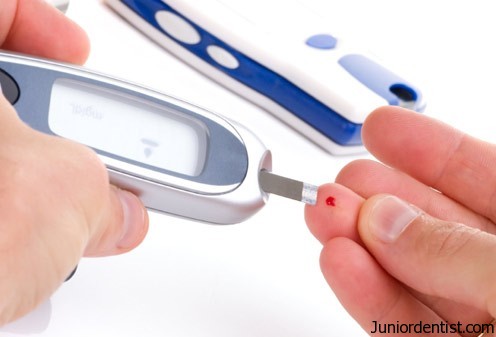Diabetes mellitus is a metabolic disorder characterized by relative or absolute insufficiency of insulin and disturbances of carbohydrate metabolism.
WHY Diabetes happens:Diabetes Mellitus occurs when the pancreas does not produce enough insulin, or when the body cannot effectively use tht insulin it produces. Cells use glucose and body needs insulin a hormone produced by B cells of pancreatic islets to get glucose to the cells. Diabetes occurs when enough insulin is not made or cannot use it correctly.
Type I diabetes:
- It is a Autoimmune destruction of the insulin producing Beta cells in Pancreas.
- Seen in children and young adults where the body’s immune system mistakenly identifies insulin producing cells as foreign bodies and destroys them.
- High incidence of severe complications are seen
Type II diabetes:
- It is seen when there is impaired insulin function or insulin Resistance
- Seen during middle age either the body dose not make enough insulin for its needs (or) the insulin is not effective as it should be your tissue does not respond the way it should or your liver produces too much glucose, generally it is a combination of both these factors.
Both types of diabetes can lead to problems with the eyes, kidneys, nerves, gums, blood vessels etc. Diabetes also is a minor risk factor for heart disease and stroke.
Gestational Diabetes:
- Defined as Any degree of glucose intolerance with onset or first recognition during pregnancy.
- Develops in 2-5% of all pregnancies but usually disappears after pregnancy.
- Women who have had gestational diabetes have an increased risk of developing type 2 diabetes later on in their lives.
Other parts of the body which are affected due to Diabetes:
- Eyes
- Kidneys
- Nerves
- Gums
- Blood vessels etc
- Diabetes also is a major risk factor for heart disease and stroke.
What is the importance of Dental Care in Diabetic Patients:
- Diabetes affects the whole body including the mouth and as we all know Diabetic Patients face higher than normal risk of Health problems which also includes Oral Health.
- This is because uncontrolled diabetes impairs white blood cells, which are the body’s main defense against bacterial infections that can occur in the mouth.
What are the main Oral or Dental Problems a Diabetic patient is at higher risk of ??
Always more importance is given to Heart Diseases, Neurological diseases, Kidney diseases and Eye Diseases and Oral Diseases caused during diabetes are overlooked most of the time. In a diabetic patient the first signs and symptoms of a medical condition can be seen first in the mouth.
- Dry mouth, xerostomia and salivary gland dysfunction
- Increased Caries susceptibility
- Fulminating Periodontal Abscess and Periodontitis
- Abnormal Neutrophil count
- Loss if taste sensation
- Oral Candidiasis
- Increased Susceptibility to Oral Diseases like Hemolytic Streptococcus, Staphylococcus
- Delayed Wound healing leads to Dry Socket
- Increased susceptibility to bacterial, viral and fungal (that is, oral candidiasis) infections
- Periapical abscesses
- Periodontitis and loss of teeth
- Lichen planus
- Burning Mouth Syndrome
- Gingivitis
General Cardinal Symptoms of Diabetes:Polyuria, Polydipsia, Polyphagia, weight loss, decreased wound healing, weakness, severe and increased intensity of infections, obesity.
Precautions and Factors Controlling Dental Treatment in a Diabetic Patient:
- Test your blood sugar level and take your blood pressure and bring these results with you to our office.
- Be prepared to update your health/dental history at each visit so we can provide you with the best possible care for your condition.
- Dental procedures should be as short and as stress free as possible.
- Make morning appointments because blood glucose levels tend to be under better control at this time of day.
- If you have a scheduled appointment, eat and take your medications as directed.
- Postpone non-emergency dental procedures if your blood sugar is not in good control. However, abscesses should be treated right away.
- Known diabetic patients Patients, receiving good medical management without serious complications such as renal disease, hypertension, or coronary atherosclerotic heart disease, can receive any indicated dental treatment
- See your dentist on a regular basis, every 3 to 4 months, for general examination and general oral care.
- Keep the dentist informed of your health status and if you have any problems controlling your blood sugar.
- Known diabetic patients to avoid hyperglycemia use anxiety reduction protocol, emotional stresses and painful conditions increase the amount of cortisol and epinephrine secretion which induce hyperglycemia so pre-treatment anxiety should be reduced by sedation pain during procedures can be avoided by a potent anesthesia
- Healing time is drastically increased in Diabetic patients because diabetes impairs white blood cells, which are the body’s main defense against infections.
- Administration of antibiotics during the postsurgical phase is appropriate, particularly if there is significant infection, pain and stress
- The selection of antibiotics is predicated on multiple factors and should be conducted in consultation with the patient’s physician.
- The combination of nonsurgical debridement and antibiotic therapy with tetracycline in patients with diabetes has a potential positive influence on glycemic control, as tetracycline usage in the treatment of periodontal disease is associated with an improvement in glycemic control.
- The dental practitioner must review any previous history of complications, assess the patient’s glycemic control and consult with the patient’s physician
- The longer the duration of the diabetes, the greater the likelihood of the patient’s developing severe periodontal disease. Supportive periodontal therapy should be provided at relatively close intervals (two to three months)
Complications with Diabetes in Dental Practice:
- Diabetic Emergencies in Dental Practice Hyperglycemia Clinical symptoms thirst, increased urine output and dehydration. progressive reduction in conscious level and hypotension, with coma and cessation of urine output in severe cases.Management Primary assessment and resuscitation securing the airway, breathing and circulation. Transport to a hospital facility.
- “Insulin Shock” The most common diabetic emergency which a dentist encounters is hypoglycemia it can lead to life-threatening consequences it occurs when the concentration of blood glucose drops below 60 mg/dL Establish adequate airway, breathing & circulation by loosening dress near the neck, switching on the fan/air conditioners, and placing the patient in the head-low-feet-up position
- In Conscious Patients after confirming the low glucose levels we should give give Oral carbohydrates in one of the following forms, fruit juice or soda, Sugar, Candy. Small amount of honey/sweet syrup can also be placed in the buccal fold.
- Insulin shock features: confusion, sweating, tremors, agitation, anxiety, dizziness, tingling or nIn unconscious patients, give 50ml of dextrose in 50% concentration or 1mg glucagon intaravenously, or give 1ml glucagon intramuscularly at almost any body site.
- Most important part: The signs and symptoms of hypoglycemia should resolve in 10 to 15 minutes The patient should be observed for 30 to 60 minutes after recovery. Normal blood glucose level is confirmed by a glucometer before the patient is allowed to leave, without confirmation do not let the patient go out of your clinic


Leave a Reply